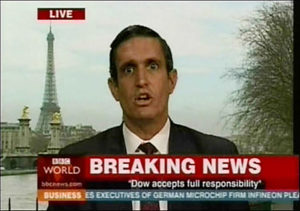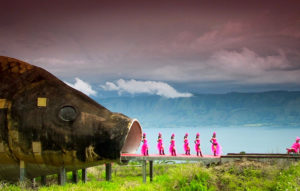In which Leshu Torchin, resident Borat expert and documentary scholar, recommends viewing to accompany Sacha Baron Cohen’s latest foray into Borat and his special brand of documentary work.
Themed Playlist: What to Watch to Prepare for Borat Subsequent Moviefilm (2020)
I confess:
I’m excited about the Borat Subsequent Moviefilm that opens 23rd October on Amazon. And not just because this already promises to have created problems for former New York City Mayor, Trump’s personal attorney, and all-around ghoul, Rudy Giuliani and has raised questions about its potential influence on the upcoming U.S. election. This latter point is not entirely convincing, any discourse about the political work of film and particularly documentary is welcome.
The sequel to Borat: Cultural Learnings of American For Make Benefit Glorious Nation of Kazhakstan, is likely as poised to make benefit for understandings of documentary and a post-truth context as its predecessor.
In the film, Sacha Baron Cohen plays Borat Sagdiyev, a Kazakh reporter making a documentary about life in the US. Although his character is fictitious, many of the interactions with him are not. Borat’s naiveté, misogyny, racism, anti-Semitism and homophobia are not only on display, but becomes a means of exposing such beliefs in many of his subjects. The hoax becomes revelatory.
As I have argued elsewhere, Borat’s mixture of mockumentary and documentary does some wonderful work as it destabilises the authority and assumptions of the documentary encounter, but not in a way that promotes radical scepticism and erodes the currency of truth or fact. Instead, if the numerous ‘what was true in Borat’ articles were any indication, it encouraged viewers to conduct deeper dives into that represented world and its ties to the shared world we inhabit: What was real and what was fiction?
In some cases, the answers were not readily apparent: How do we even begin to unpick the nude wrestling match between two fictional characters (Borat and his producer) in which the physicality of this encounter seemed undeniable?
The questions provoked afforded insight into the documentary tradition: both in its reliance on an investigator with a camera empowered to produce a truth through their own perspective, and through its gestures to other documentaries, mockumentaries, and hoaxes, which have helped encourage these questions all along.
Borat’s Subsequent Moviefilm is likely going to return to these questions, bringing more potential for reflection as its approach has the fictional character of Borat now in costume (having become too recognisable) and it returns to us in a post-truth context, where facts have been devalued in favour of opinion.
My guess is that Inception Borat in a fake news era will bring a number of opportunities for reflection. In the meanwhile, though, here are some films to remind us that Baron Cohen’s work is not new, and that the navigation of truth and fiction, power and authority, and the implications of representation have been going on for some time.
Las Hurdes/ Land Without Bread (Luis Buñuel, 1933)
The prologue to Borat (the first film) establishes itself within Luis Buñuel’s world. This ostensible study of human geography seems to offer little more than a scene of poverty, misery, and atavism so dispassionately chronicled by its narrator that is opens up questions of ethical responsibility (of visitors and documenters) and the relationship between soundtrack and image. Borat’s tour is more gleeful, but it plays with the questionable declarations that imagine the East as hopelessly backwards, violent, and diseased as much as it unfortunately reinforced them for some. Mercedes Stalenhoef’s When Borat Came to Town deals with the fallout in the Romanian town of Glod, used to portray Borat’s ‘Kuzcek’ which offers further questions around ethics, representation, and documentary practice. Someone has uploaded the video onto YouTube.
LasHurdes is available on YouTube:
The Silent Village (Humphrey Jennings, 1943)
Produced under the provenance of the Crown Film Unit, The Silent Village has the real-life villagers of Cwmgiedd in Wales (re)enact the Nazi 1942 invasion of the mining village of Lidice in Czechoslovakia, resulting in the massacre of its male population. However, the film does not present this Welsh mining village as Czechoslovakian but instead offers a counter-factual history whereby the occupation results first in the erosion of Welsh language before moving to the horrifying conclusion. It is a startling film for the emotional truths that resonate within an ostensible fiction: Not only does this provide a visceral call for war support (and solidarity through mining communities) but it gestures to another occupation closer to home: that of England in Wales.
It is a reminder of the truths that inhere to the fictions, both explicit and implicit.
The film is available on DailyMotion: https://www.dailymotion.com/video/x27e0sw
The Couple in the Cage: Guatanaui Odyssey (Coco Fusco and Paula Heredia, 1997)

The Couple in the Cage offers a chronicle of an unintentional hoax. In conjunction with the Columbus sesquicentennial in 1992, artists Guillermo Gómez-Peña and Coco Fusco planned a travelling show in which they exhibited themselves as ‘undiscovered’ Amerindians from the island of Guatanaui. They were to appear in a cage at various sites of colonisation—including Plaza de Colón (Columbus) in Madrid and a host of natural history museums in the U.S and Australia. Despite what would seem to be clear fiction (garb that included coconuts, grass skirts, luchador masks, and converse hi-tops), it became clear that visitors to these sites were reading satirical commentary as fact.
This film chronicles those interactions, allowing for further reflection on the nature of knowledge, authority, and power. Both artists are amazing and prolific and I encourage you to find out more about them and to read their own reflections on this experience.
Have your institution purchase a copy for the library through Video Data Bank. But it is available here.
The Yes Men (Of course)

There are at least three films within this category: The Yes Men (Dan Ollman, Sarah Price, and Chris Smith, 2003); The Yes Men Fix the World (Andy Bichlbaum and Mike Bonanno, 2009), and The Yes Men Are Revolting (Andy Bichlbaum, Mike Bonanno, and Laura Nix, 2014)
The Yes Men are pranksters and tricksters in the business of ‘identity correction’. They use hoaxes to reveal the truth of operations hidden under corporate speak and presentations, whether in their presenting new risk assessment calculators (used by corporations to weigh the cost of human damage against possible profit) or pretending on the BBC to be Dow Chemical taking responsibility for the Bhopal Disaster. They may be pretend, but the responses they produce are very real, and often shocking as they reveal how little humans and the environment figure into decision making processes of financial and political organisations. These documentaries inhabit an interesting space: chronicle of hoaxes, but also mingled with fiction—particularly as the first two are credited as directed by The Yes Men personas rather than the artist/activists behind the men.
I would recommend watching everything they do and becoming involved with their projects through their website.
In the meanwhile, two viewings are posted here:
The Yes Men Fix the World:
https://www.youtube.com/watch?v=OazUh0Ym8rc
And a delightful early project from The Barbie Liberation Organisation which merges hoax, satire, and actual footage:
And although I said two, I wanted to add Cesky Sen/ Czech Dream (Vit Klusák and Filip Remunda, 2004). This documentary chronicles a hoax in which Klusák and Remunda promote and advertise an imaginary hypermarket outside Prague.
Available on Vimeo:
Jagal/ The Act of Killing (Josh Oppenheimer, Christine Cynn, Anonymous, 2012)

This controversial documentary chronicles genocidaires (perpetrators of the Indonesian massacres of 1965-55) as they make a film about their actions. Their approach is hardly sombre, as these men have continued with impunity; rather, it is flamboyant and spectacular with gestures to many popular genres.
The documentation of the perpetrators’ fantasy (mired in a horrific truth) affords us the chance to reflect on how histories and films are told from a particular perspective. In looking for the truth in the stories people tell themselves, director Joshua Oppenheimer draws on the legacy of ethnographic and documentary filmmaker Jean Rouch, whose ethnofictions like Moi, Un Noir (1958), La Pyramide Humaine, and Petit à Petit did just that.
The Act of Killing is available on Amazon Prime.
There are, of course, more films one could add. I might update, but I also welcome your additions in the comments.
***
Leshu Torchin is Senior Lecturer in Film Studies at the University of St Andrews. She works documentary and the ways film and media are used for social change. She writes a lot about Borat and Sacha Baron Cohen.
